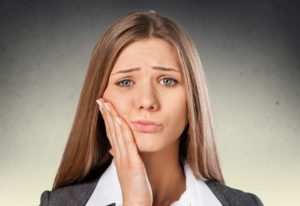Why Does My Jaw Hurt in the Morning?
May 25, 2023
 Does your jaw hurt in the morning? You might attribute it to your sleeping position or another minor issue, but it can be a sign of an underlying problem. You might have a habit of grinding or clenching your teeth while you’re sleeping. Not only can this damage your teeth, but it can also cause a disorder of your temporomandibular joints (TMJ). Here’s what might be behind your jaw pain and what you can do to stop the discomfort.
Does your jaw hurt in the morning? You might attribute it to your sleeping position or another minor issue, but it can be a sign of an underlying problem. You might have a habit of grinding or clenching your teeth while you’re sleeping. Not only can this damage your teeth, but it can also cause a disorder of your temporomandibular joints (TMJ). Here’s what might be behind your jaw pain and what you can do to stop the discomfort.
Common Causes of Morning Jaw Pain
Bruxism is a habit of grinding or clenching your teeth. Many people aren’t aware of the gnashing because they’re asleep when it happens. Although a dentist can spot the signs of bruxism right away, symptoms can manifest differently for everyone, like having a stiff or sore jaw in the morning.
Bruxism is also connected with TMJ disorders. Your temporomandibular joints are located on either side of your face, connecting your jaw to your skull. The joints can become inflamed and irritated from various factors, like grinding your teeth. This can cause limited mobility of the joints and your jaw may even lock in certain positions. You can experience facial pain, earaches, and many other complications.
Not only can bruxism lead to a TMJ disorder, but issues with the joints can also trigger teeth grinding. The stress and inflammation in the joints can lead to a subconscious habit of clenching your jaw at night.
Managing Morning Jaw Pain
Managing bruxism and TMJ disorders can be challenging, but with a few simple changes, you can wait up in the morning feeling your best, such as:
- Eat Soft Foods: Eat soft foods that require minimal chewing to put less pressure on your joints.
- Use Cold and Heat: Alternate hot and cold compresses to alleviate muscle tension.
- Manage Stress Levels: Practice stress-relieving exercises to reduce the occurrence of Bruxism.
- Use Anti-Inflammatories: Take an over-the-counter anti-inflammatory to manage your discomfort.
- Treat Bruxism: Ask your dentist for a nightguard if you have bruxism. It will provide a protective barrier between your upper and lower teeth to safeguard your smile.
- Fix Your Bite: A misaligned bite can cause both conditions. Orthodontics can create harmony between the upper and lower arches to improve your oral functions.
- Wear an Oral Appliance: An oral appliance can train your jaw to rest in a more comfortable position to resolve TMJ symptoms.
Pain-free mornings are possible. If changes at home don’t help, contact your dentist for TMJ therapy.
About Dr. J. Peter St. Clair
Dr. St. Clair earned his dental degree from the Tufts University School of Dental Medicine and has regularly continued his education to provide many specialties, like TMJ therapy, sleep apnea, and restorative dentistry. He strives to provide personalized treatment plans to help each patient look and feel their best. If you have jaw pain, request an appointment through our website or call (978) 948-2030.
No Comments
No comments yet.
RSS feed for comments on this post.
Sorry, the comment form is closed at this time.







